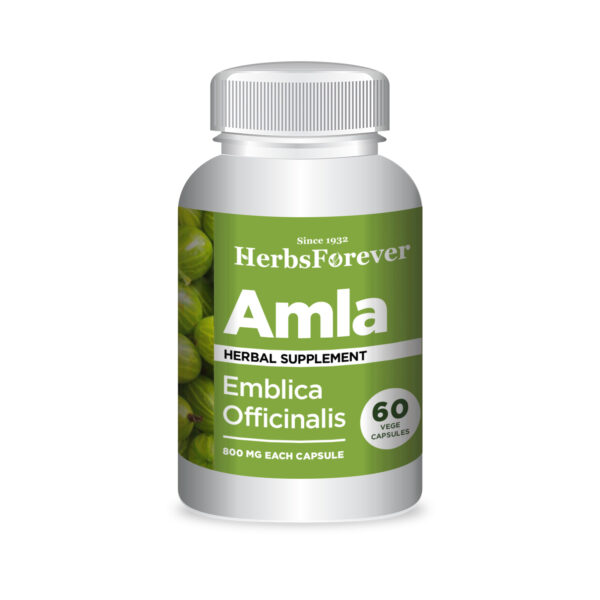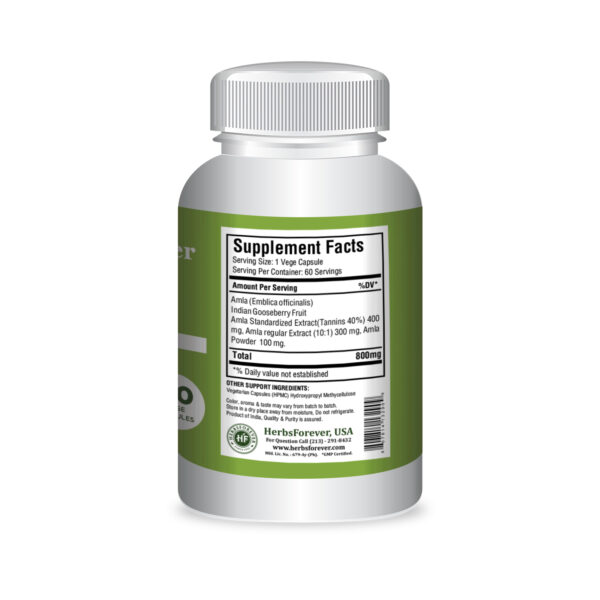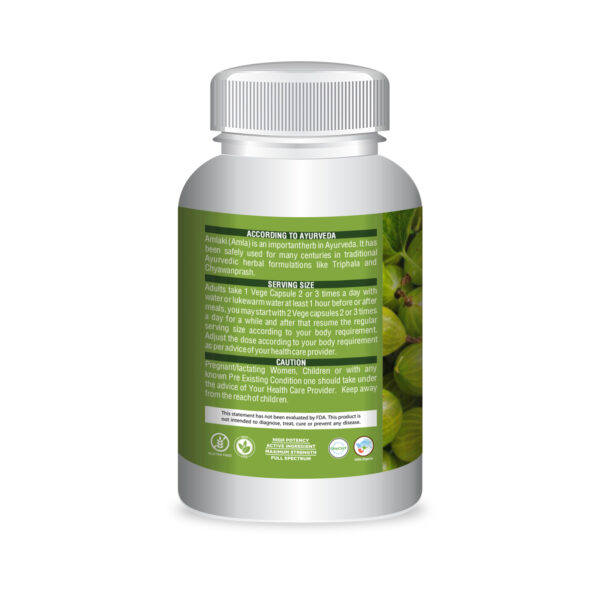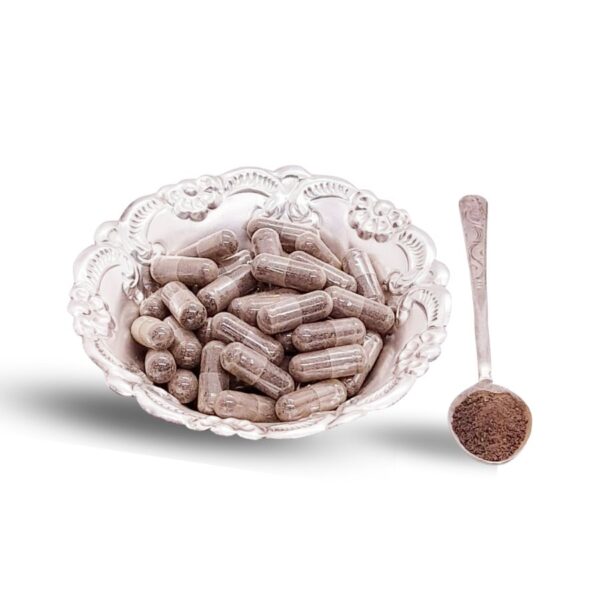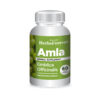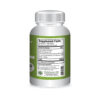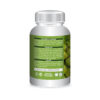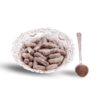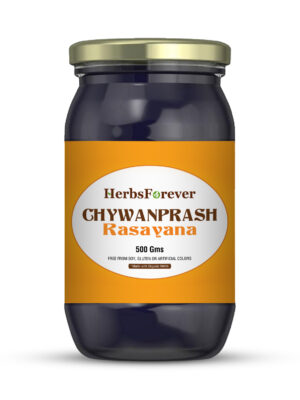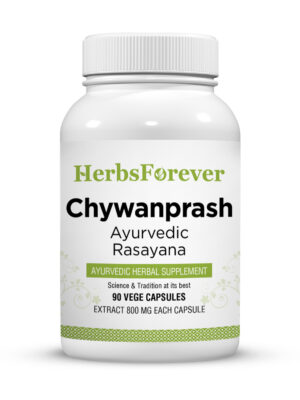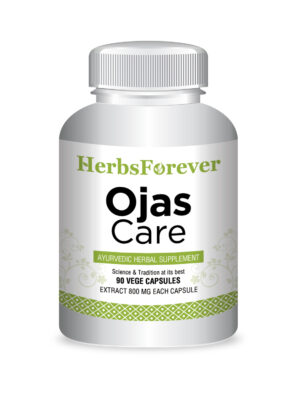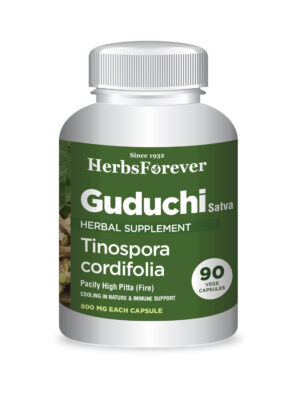Amla (Amlaki)
$17.95
Primary Benefits as per Ayurveda
- Amla is a natural source of vitamin C.
- Amla is rich in antioxidants and protects us from harmful free radicals which contribute to a healthy body.
- Amla is one of the supportive herbs in our product Heart Health, Cholesterol Health, Optica, Gluco Health, Cardio-B.
Also available as…
-
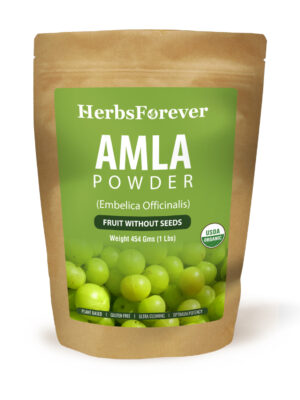
Amla Powder Organic
$10.50 – $18.95 -
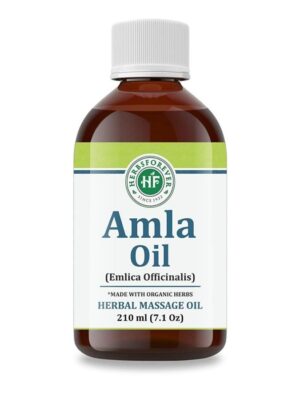
Amla Oil
$16.95
Other Benefits as per Ayurveda
- Amla also helps boost protein metabolism so if you exercise and workout regularly you will benefit greatly from regular Amla intake.
- As Amla supports healthy metabolism, it helps in the fit body diet plan.
- Amla helps strengthen the liver and detoxifies.
- Helps to fight daily life stress.
- Amla has been identified to have potent Antioxidant, immunomodulatory properties that help to combat daily life stress.
- It is widely used in traditional hair and skincare formulations.
Ayurvedic Herbal Formulation
Full Spectrum Extract ratio (10:1) with 40% Tannins
The extract is dried with the powder of the same herb (Reference: Dose standards as per United states pharmacopeia 35 Edition)
Part Used: Fruit
Dietary Supplement
- It is traditional Ayurvedic herbs that have been used in Ayurveda since time immemorial.
- Supports digestion.
- Supports vision, hair & nail health.
- Helps to build proper immune coordination.
- Nutritional support with a natural source of vitamin C.
As per Ayurveda
Excellent Source of Vitamin C: Amalaki is the most concentrated form of vitamin C found in plant Kingdom and when the whole fruit is used rather than an active ingredient the Vitamin C is easily assimilated by the human body. The Vitamin C in the Amalaki fruit is bonded with tannins that protect it from being destroyed by heat or light. Amla fruit has 20 times more vitamin C than an orange. It acts as a natural support and supports a healthy immune system.
Antioxidant: Amla is rich in antioxidants and protects us from harmful freeradicals
Enhances food absorption: Regular use of Amla can strengthen digestion, absorption, and assimilation of food. People taking amla daily enjoy the taste of food better. It enhances all thirteen digestive fires (Agni) but it works more slowly and gently than ginger or other digestion enhancing herbs. So it can be taken by people with a lot of Pitta (fire) (Agni) dosha without fear. In addition, it improves the assimilation of iron for healthy food.
Composition
High quality extracts of ayurvedic herbs from their natural habitats.
All the herbs used in this product have a safe history of usage in Ayurveda since the time immemorial. They have very unique benefits with unique herbal properties.
Combined effects of all these herbs formulated in such a way that help to bring all three Doshas (Humors) Vata (air), Pitta (fire) and Kapha (water) in their natural balanced state.
Chemical Composition
Aside from Vitamin C, Amla’s mineral and vitamin contents include calcium, Phosphorus, Iron, Carotene, Carbohydrates, Thiamine, and Riboflavin. Fruit in the natural form: Vitamin C, Linoleic Acid, Indoleacetic Acid and Ayxubsm trigalo glucose.
Common & Uncommon Names
- Family Name: Euphorbiaceae
- Botanical Name: Emblica Officinalis
- English Name: Indian Gooseberry
- Hindi Name: Amla
- Sanskrit Name: Amalaki
Uncommon Names of This Herb
(German) Emblica, Mirabolano Emblico (Italian), Amara (Japanese), Phyllanthus Emblic (French), Nellikai (Malaysian), Makham Pom (Thai).
Properties
It is sour (Amla) in taste (Rasa) but sweet (Madhur) after digestion (Vipaka), Madhur (Sweet), Amla (Sour), Katu (Pungent), Kashaya (Astringent) except Lavana (Salt) in characteristics, Cold (Sita) in potency (Virya).
Action: It helps to balance all the Tridosha [Three humors – Vata (Air), Pitta (Fire) and Kapha (Water)]. It has Rejuvenating (Rasayana), anti-aging, Chakshusha (works as an eye tonic) properties.
Directions for Use
- Adult: 1 Vege Capsules 2 or 3 time’s in a day with water after 1 – 2 hrs. of meal.
- Adjust the dosage as per your body requirement or as per the advice of your practitioner.
- Our main preparations of Amla used as a main component are: Chywanprasha, Amalaki Powder, Triphala Churna and Triphala Capsules.
Precautions
- Intake of incompatible food items and Liquids, Heavy Substances, New Cereals, Sour Food, Use of excessive cold and hot food.
- Children to use under the supervision of a health practitioner.
- Pregnant/Lactating women, children or anyone with known pre-existing condition should strictly take under the advice of a healthcare provider. Keep away from the reach of children.
Ayurvedic Lifestyle
Nutritional diet, Morning walk, Yoga, Peaceful mind, Restful sleep.
Special Notes
Color, Taste, Aroma of the product may change from batch to batch.
Tested for quality purity and heavy metal standards.
**These statements have not been evaluated by the Food and Drug Administration. This product is not intended to diagnose, treat, cure or prevent any Disease.
| Weight | 4 oz |
|---|
Also available as…
-

Amla Oil
$16.95 -

Amla Powder Organic
$10.50 – $18.95

